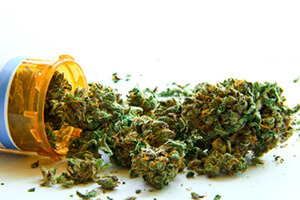How Long Does Marijuana Stay in Your System?
 It’s no secret that marijuana is a commonly used, mostly-illegal drug in many parts of the United States, which is ironic because although it can be misused it has not caused any sort of death overdose epidemic like heroin has. Because of this, drug tests are often administered if there is suspicion of use or a past history of use. In order to understand how long marijuana stays in your system, it is important to understand what marijuana is, how it is used or abused and how it affects the body in relation to drug testing for THC.
It’s no secret that marijuana is a commonly used, mostly-illegal drug in many parts of the United States, which is ironic because although it can be misused it has not caused any sort of death overdose epidemic like heroin has. Because of this, drug tests are often administered if there is suspicion of use or a past history of use. In order to understand how long marijuana stays in your system, it is important to understand what marijuana is, how it is used or abused and how it affects the body in relation to drug testing for THC.
What Is Marijuana / THC?
According to information from the Drug Enforcement Administration, “Marijuana is a mind-altering (psychoactive) drug, produced by the Cannabis sativa plant. Marijuana contains over 400 chemicals. THC (delta-9-tetrahydrocannabinol) is believed to be the main chemical ingredient that produces the psychoactive effect.” Also known as pot, weed, grass and dope, among other names, marijuana is a frequently used drug, even though it is illegal in many states. In fact, according to the National Institute on Drug Abuse, marijuana is the most commonly used illicit drug in the country. In 2015 alone, more than 11 million people ages 18 to 25 smoked marijuana at some point in their life.
How Marijuana Affects Your System
The active ingredient in marijuana is tetrahydrocannabinol, also called delta-9-THC or simply THC. It enters the body's bloodstream rapidly after smoking marijuana. If marijuana is ingested rather than smoked, it takes longer to be absorbed into the blood, usually from 20 minutes to an hour and a half.
The short-term effects of marijuana on memory, learning, problem-solving, and coordination last for one to two hours, with some lingering effects for up to 24 hours. It's been shown to impair your driving performance for up to three hours, according to the studies quoted by the National Highway Safety Administration.
THC is detectable in the blood for a short time, about a few hours, because it is rapidly broken down and modified into molecules known as metabolites. At least 80 different metabolites are formed from THC. These metabolites are stored in body fat and are gradually eliminated from the body through feces and urine.
Effects Of Marijuana On The Brain
Cannabinoids interact with receptors in the brain. Tetrahydrocannabinol (THC) is the most common cannabinoid, and is similar to a brain chemical called anandamide. This chemical’s job is to communicate with other areas of the brain to control:
- pleasure
- memory
- thinking
- concentration
- movement
- coordination
- sensory and time perception
THC interferes with normal functioning of these areas by attaching to cannabinoid receptors and disrupting communication. Over time, the brain may stop producing as much of its natural chemical, as it may become accustomed to THC taking its place.
Prolonged marijuana use may also affect other parts of the brain, possibly stunting the ability to focus, shift attention, or form new memories.
Dangers Of Marijuana Abuse
The high from marijuana can be a pleasant feeling of relaxation. It can also make a person feel anxious, fearful, and paranoid. This may happen when someone takes too much or doesn’t have much experience. In many cases, the effects of marijuana depend on the individual.
With regular use, a person may develop a tolerance to marijuana. As the body adjusts to the substance, it will require more and more of it to produce the same high. This can lead to marijuana use disorder, a mental dependence that can make it difficult for a person to stop using marijuana.
In addition to potentially harming the mind and body, marijuana abuse can adversely affect someone’s lifestyle. Regular cannabis use can inhibit attention, memory, and learning. This may cause poor performance at school or work. It may also promote a less active lifestyle, which can lead to other health issues.
How Long Does Marijuana Stay in Your System?
Marijuana itself does not stay in the body for long periods of time, which is why hemp and other marijuana based products are safe to use and will not cause you to fail a drug test for marijuana. Instead, chemicals from marijuana do. THC, the main chemical in marijuana, is the chemical that creates a high and is what remains in the system. Though the effects of THC wear off within a few hours of ingesting marijuana, traces of the chemical can remain in the body for weeks. This is because after marijuana passes from the lungs to the blood stream, THC bonds to fat cells, then breaks down over time. The amount of time this takes depends on a variety of factors, including the amount of marijuana used, the method it’s used, the frequency of use, a user’s metabolism and the amount of THC in the marijuana. There are two main substances that show up in drug tests and indicate marijuana use: THC and 9-carboxy-THC, which is a byproduct of the metabolism of THC. This substance, also called a metabolite, is detectable for a longer period of time than THC. Marijuana can show on a urine, blood, saliva or hair follicle drug test for up to 120 or more days, depending on a number of factors – so always make sure to do your research before making a huge mistake.
Limitations of Drug Tests for Marijuana
Because marijuana stays in the bloodstream for only a short time, blood tests for marijuana are usually not used. The exceptions are in the case of automobile accidents and some roadside sobriety checkpoints. Blood or saliva tests can show current intoxication. However, unlike blood alcohol concentration tests, they do not indicate a level of intoxication or impairment.
Urine tests for marijuana metabolites can only show recent marijuana use, not intoxication or impairment. This is because of the time required between smoking and your body breaking down THC to the metabolites that are eliminated in the urine. However, because many employers have a zero tolerance for drug use, most workplaces use urine tests for any recent use of drugs.
While urine testing is most common, other methods of detection include:
- Blood: After a single use, marijuana may be found in blood for two to three days. With regular use, it may be detected for up to two weeks.
- Saliva: With single use or repeated use, there may be traces of marijuana in saliva for 12 to 24 hours.
- Hair: Marijuana may be present in hair for up to 90 days, regardless of how often it is used.
While these are basic guidelines, there are still many more details that can influence how quickly marijuana is expelled from the body.
Treatment For Marijuana Use Disorder
Marijuana use disorder is a mental disease that can be challenging to overcome alone. Inpatient drug rehab centers offer programs that can help someone who is struggling with a mental dependence on marijuana. These programs may include a variety of treatment methods and can be customized to individual needs.
A marijuana use disorder does not have to interfere with someone’s productivity and health. Exploring treatment options to find the best fit may be the first step to a more fulfilling life.
Contact us today to learn more about marijuana use disorder and treatment options.
-
Sources
National Drug Court Institute — Drug Court Practitioner Fact Sheet
National Institute on Drug Abuse — Marijuana




